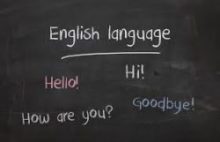Online Education Worldwide.



You can download the Syllabus guide, clicking on the link below
For Year 13: https://www.aqa.org.uk/subjects/languages/as-and-a-level/spanish-7692
English International Maps knowledge Base


English has a pre-eminent place in education and in society. A high-quality education in English will teach pupils to speak and write fluently so that they can communicate their ideas and emotions to others, and through their reading and listening, others can communicate with them.
Through reading in particular, pupils have a chance to develop culturally, emotionally, intellectually, socially and spiritually. Literature, especially, plays a key role in such development. Reading also enables pupils both to acquire knowledge and to build on what they already know. All the skills of language are essential to participating fully as a member of society; pupils who do not learn to speak, read and write fluently and confidently are effectively disenfranchised.

English in the national curriculum is to promote high standards of language and literacy by equipping pupils with a strong command of the spoken and written language, and to develop their love of literature through widespread reading for enjoyment.
The national curriculum for English aims to ensure that all pupils:

English reflects the importance of spoken language in pupils’ development across the whole curriculum – cognitively, socially and linguistically. Spoken language underpins the development of reading and writing. The quality and variety of language that pupils hear and speak are vital for developing their vocabulary and grammar and their understanding for reading and writing. Teachers should therefore ensure the continual development of pupils’ confidence and competence in spoken language and listening skills.

Pupils should develop a capacity to explain their understanding of books and other reading, and to prepare their ideas before they write.
They must be assisted in making their thinking clear to themselves as well as to others, and teachers should ensure that pupils build secure foundations by using discussion to probe and remedy their misconceptions. Pupils should also be taught to understand and use the conventions for discussion and debate.
All pupils should be enabled to participate in and gain knowledge, skills and understanding associated with the artistic practice of drama.

Pupils should be able to adopt, create and sustain a range of roles, responding appropriately to others in role.
They should have opportunities to improvise, devise and script drama for one another and a range of audiences, as well as to rehearse, refine, share and respond thoughtfully to drama and theatre performances.
Statutory requirements which underpin all aspects of spoken language across the 6 years of primary education form part of the national curriculum. These are reflected and contextualised within the reading and writing domains which follow.

The programmes of study for reading at key stages 1 and 2 consist of 2 dimensions:
It is essential that teaching focuses on developing pupils’ competence in both dimensions; different kinds of teaching are needed for each.
Skilled word reading involves both the speedy working out of the pronunciation of unfamiliar printed words (decoding) and the speedy recognition of familiar printed words. Underpinning both is the understanding that the letters on the page represent the sounds in spoken words. This is why phonics should be emphasised in the early teaching of reading to beginners (ie unskilled readers) when they start school.
Good comprehension draws from linguistic knowledge (in particular of vocabulary and grammar) and on knowledge of the world. Comprehension skills develop through pupils’ experience of high-quality discussion with the teacher, as well as from reading and discussing a range of stories, poems and non-fiction.

All pupils must be encouraged to read widely across both fiction and non-fiction to develop their knowledge of themselves and the world they live in, to establish an appreciation and love of reading, and to gain knowledge across the curriculum. Reading widely and often increases pupils’ vocabulary because they encounter words they would rarely hear or use in everyday speech. Reading also feeds pupils’ imagination and opens up a treasure house of wonder and joy for curious young minds.
It is essential that, by the end of their primary education, all pupils are able to read fluently, and with confidence, in any subject in their forthcoming secondary education

The programmes of study for writing at key stages 1 and 2 are constructed similarly to those for reading:
It is essential that teaching develops pupils’ competence in these 2 dimensions. In addition, pupils should be taught how to plan, revise and evaluate their writing. These aspects of writing have been incorporated into the programmes of study for composition.

Writing down ideas fluently depends on effective transcription: that is, on spelling quickly and accurately through knowing the relationship between sounds and letters (phonics) and understanding the morphology (word structure) and orthography (spelling structure) of words. Effective composition involves articulating and communicating ideas, and then organising them coherently for a reader. This requires clarity, awareness of the audience, purpose and context, and an increasingly wide knowledge of vocabulary and grammar. Writing also depends on fluent, legible and, eventually, speedy handwriting.

The 2 statutory appendices – on spelling and on vocabulary, grammar and punctuation – give an overview of the specific features that should be included in teaching the programmes of study.

As vocabulary increases, teachers should show pupils how to understand the relationships between words, how to understand nuances in meaning, and how to develop their understanding of, and ability to use, figurative language. They should also teach pupils how to work out and clarify the meanings of unknown words and words with more than 1 meaning. References to developing pupils’ vocabulary are also included in the appendices.
Pupils should be taught to control their speaking and writing consciously and to use Standard English. They should be taught to use the elements of spelling, grammar, punctuation and ‘language about language’ listed.

This is not intended to constrain or restrict teachers’ creativity, but simply to provide the structure on which they can construct exciting lessons.
Throughout the programmes of study, teachers should teach pupils the vocabulary they need to discuss their reading, writing and spoken language. It is important that pupils learn the correct grammatical terms in English and that these terms are integrated within teaching.
By the end of each key stage, pupils are expected to know, apply and understand the matters, skills and processes specified in the relevant programme of study.

key stage 3 – GCSE – A Levels and Further Education Guide

Subject content
English has a pre-eminent place in education and in society. A high-quality education in English will teach pupils to speak and write fluently so that they can communicate their ideas and emotions to others and through their reading and listening, others can communicate with them. Through reading in particular, pupils have a chance to develop culturally, emotionally, intellectually, socially and spiritually. Literature, especially, plays a key role in such development. Reading also enables pupils both to acquire knowledge and to build on what they already know. All the skills of language are essential to participating fully as a member of society; pupils, therefore, who do not learn to speak, read and write fluently and confidently are effectively disenfranchised.
The overarching aim for English in the national curriculum is to promote high standards of language and literacy by equipping pupils with a strong command of the spoken and written word, and to develop their love of literature through widespread reading for enjoyment. The national curriculum for English aims to ensure that all pupils:


The national curriculum for English reflects the importance of spoken language in pupils’ development across the whole curriculum – cognitively, socially and linguistically. Spoken language continues to underpin the development of pupils’ reading and writing during key stage 4 and teachers should therefore ensure pupils’ confidence and competence in this area continue to develop. Pupils should be taught to understand and use the conventions for discussion and debate, as well as continuing to develop their skills in working collaboratively with their peers to discuss reading, writing and speech across the curriculum.
Reading at key stage 4 should be wide, varied and challenging. Pupils should be expected to read whole books, to read in depth and to read for pleasure and information.
Pupils should continue to develop their knowledge of and skills in writing, refining their drafting skills and developing resilience to write at length. They should be taught to write formal and academic essays as well as writing imaginatively. They should be taught to write for a variety of purposes and audiences across a range of contexts. This requires an increasingly wide knowledge of vocabulary and grammar.
Opportunities for teachers to enhance pupils’ vocabulary will arise naturally from their reading and writing. Teachers should show pupils how to understand the relationships between words, how to understand nuances in meaning, and how to develop their understanding of, and ability to use, figurative language.
Pupils should be taught to control their speaking and writing consciously, understand why sentences are constructed as they are and to use Standard English. They should understand and use age-appropriate vocabulary, including linguistic and literary terminology, for discussing their reading, writing and spoken language. This involves consolidation, practice and discussion of language. It is important that pupils learn the correct grammatical terms in English and that these terms are integrated within teaching.

Reading at key stage 4 should be wide, varied and challenging. Pupils should be expected to read whole books, to read in depth and to read for pleasure and information.

Pupils should continue to develop their knowledge of and skills in writing, refining their drafting skills and developing resilience to write at length. They should be taught to write formal and academic essays as well as writing imaginatively. They should be taught to write for a variety of purposes and audiences across a range of contexts. This requires an increasingly wide knowledge of vocabulary and grammar.
Opportunities for teachers to enhance pupils’ vocabulary will arise naturally from their reading and writing. Teachers should show pupils how to understand the relationships between words, how to understand nuances in meaning, and how to develop their understanding of, and ability to use, figurative language.
Pupils should be taught to control their speaking and writing consciously, understand why sentences are constructed as they are and to use Standard English. They should understand and use age-appropriate vocabulary, including linguistic and literary terminology, for discussing their reading, writing and spoken language. This involves consolidation, practice and discussion of language. It is important that pupils learn the correct grammatical terms in English and that these terms are integrated within teaching.
Teachers should build on the knowledge and skills that pupils have been taught at key stage 3. Decisions about progression should be based on the security of pupils’ linguistic knowledge, skills and understanding and their readiness to progress to the next stage. Pupils whose linguistic development is more advanced should be challenged through being offered opportunities for increased breadth and depth in reading and writing. Those who are less fluent should consolidate their knowledge, understanding and skills, including through additional practice.

Pupils should be taught to:

Pupils should be taught to:
NOTE: This it is for full year courses. Will be adapting for a 5 days per week for intensive courses.


Copyright©2021 - Colegio Online Aparicio / All rights reserved / Privacy Policy